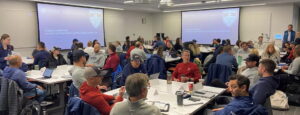Not every MBA has a background in neurobiology, consulting, and programming like Yifan Chen, WG’20 — but streamlining his career took walking an atypical path. After Yifan decided against medical school, he explored the financial services industry, and then enrolled in a full-time coding bootcamp. He gained some experience as a software engineer at a medical device startup before deciding to pursue his MBA at Wharton to gain an edge in the industry.
“I became interested in positioning myself as someone uniquely close to the code, but also able to see things from a higher-level business perspective,” said Yifan. “I thought that getting an MBA would be a great way to consolidate my experience and give me the time to reflect as I catapult into the next step.”
Transferable Lessons
One of the first steps Yifan took was participating in the Wharton Customer Analytics Initiative (WCAI) Analytics Accelerator last semester. He was one of two MBA engagement leads on a team of six undergraduate, graduate, and PhD students from Penn and Wharton, helping law firm Reed Smith extract meaningful insights from their time card data.
Yifan integrated practical skills he gained from consulting and engineering, while providing big-picture guidance and acting as a conceptual translator between the team and their client. He focused on making sure everyone on his team got the most out of their experience.
“Through my years in consulting, one of the most important things I learned is that understanding incentives and mastering communication are crucial for working cross-functionally,” he said. “I think that’s a skill that’s often underappreciated, but it’s extremely valuable, especially for engineers who want to explore the business side, or MBAs who want to explore the more technical side of things.”

Yifan’s team applied machine learning techniques to fill in any missing or incorrect data, before analyzing it to identify areas of interest: which practice might be bringing in the most revenue, which types of work might take lawyers the longest, or looking forward, how to allocate attorney resources to maximize business value for the firm.
Yifan said the relationships he built with the client and with team advisor and WCAI faculty director Prof. Eric T. Bradlow were another valuable takeaway. Bradlow’s information session during MBA Pre-Term in August 2018 was what inspired Yifan to get involved in the first place.
“One of the things that [Bradlow] said during the Accelerator Summit was that for him, this is one of the most incredible teaching experiences,” Yifan said. “On our side, it was an incredible learning experience.”
Linking Cultures
Yifan believes his various personal and professional interests have made him something of a “relationship broker” between people. It’s a role he carries on campus as a member of the Greater China Club for Chinese international students and as a board member of the Wharton Asian-American Association of MBAs (WAAAM), in charge of interfacing with external organizations.
He sees himself positioned in the middle of those groups.
“I was born in northwest China, where there are very few people who immigrate to the U.S.,” Yifan explained. “That’s something that’s influenced me, especially as I’ve lived the past six years in New York City, being able to connect with some culture aspects that are more Central Asian.”
As a programming and web development mentor for conflict-affected youth in the Middle East at Re:Coded, he connected to how his mentees turned to coding to pave a future out of adversity. Yifan is currently on track to major in entrepreneurship and innovation but he maintains that being fluent in tech can be a powerful tool for anyone — high schooler or business executive.
“There’s usually little educational investment in conflict-affected parts of the world,” he said. “However, both learning to code and coding as a profession don’t require many physical resources. There’s a ton of demand for that coding skillset. And you’re not geographically limited. You can code remotely and bring value to any company across the world.”
— Gloria Yuen
Posted: January 16, 2019



















